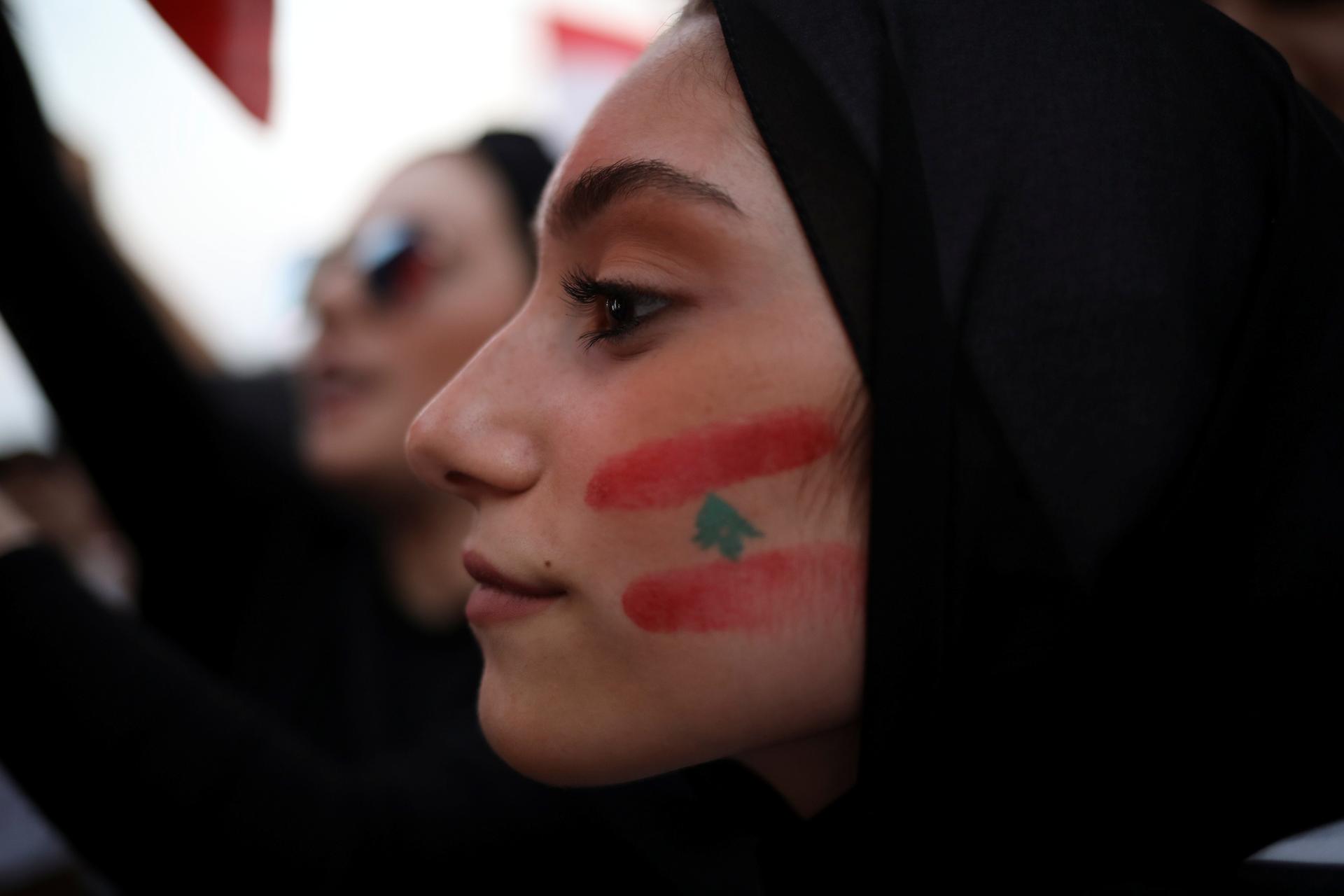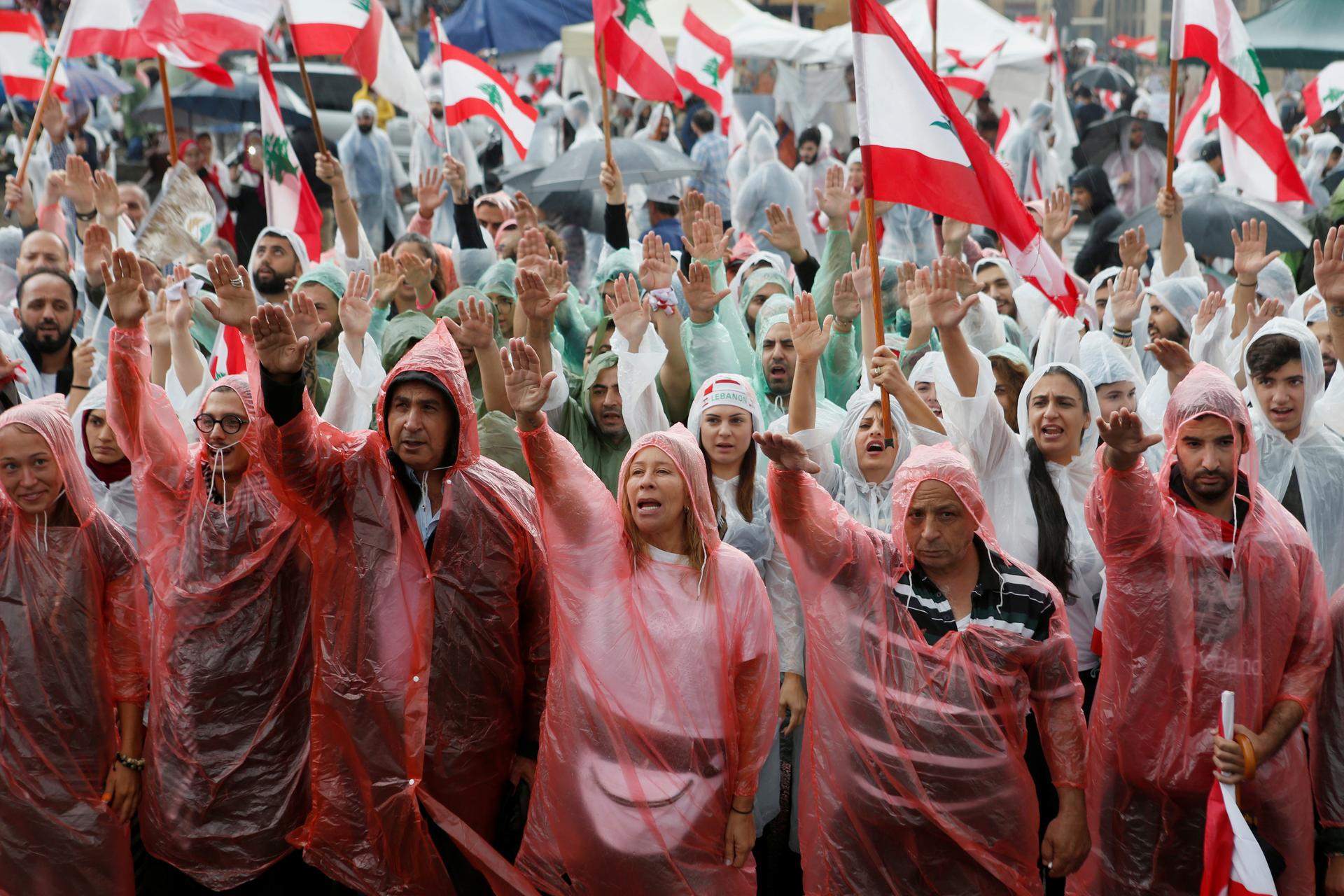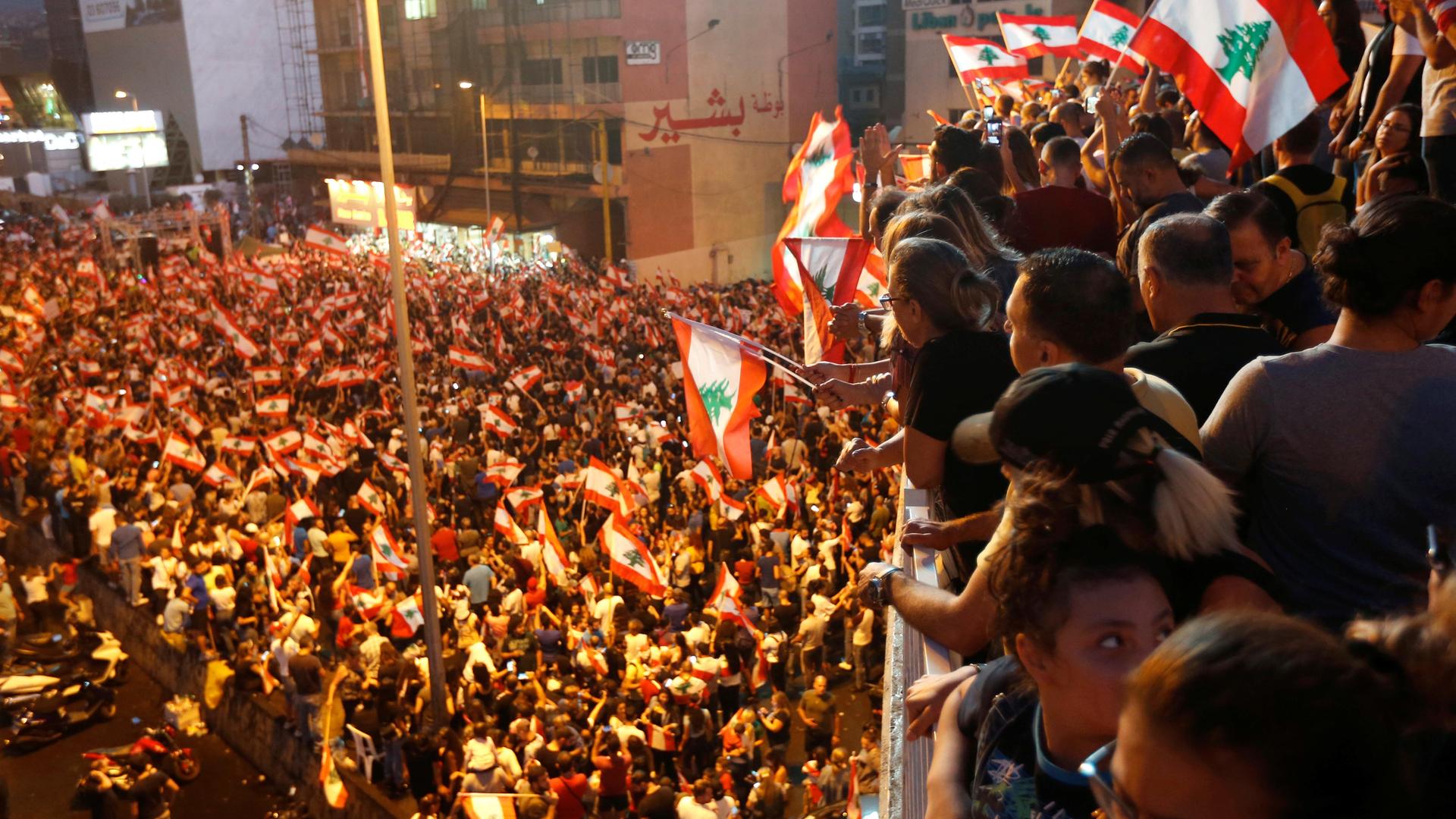How Lebanon’s ‘WhatsApp tax’ unleashed a flood of anger
Demonstrators carry national flags as they stand on a bridge during an anti-government protest along a highway in Jal el-Dib, Lebanon, on Oct. 21, 2019.
For more than a week, hundreds of thousands of protesters have taken to the streets throughout Lebanon, calling for all the country’s leaders to step down.
They have paralyzed the country, closing banks, schools and major highways as people from all segments of society join the mass civil disobedience. Perhaps the largest protests in the country’s post-civil war history, they have brought Lebanese people together in a way not seen in decades, if ever. The mood on the streets has been festive, complete with food vendors, argileh pipes, and film showings in buildings abandoned since the country’s civil war, which ended in 1990.
The protests were nominally sparked by a new proposed tax on internet calls through services such as WhatsApp, which many Lebanese rely on because regular phone calls and texts are prohibitively expensive. It was one of many austerity measures proposed to address financial problems.
But frustration had already been building for years in Lebanon over widespread corruption, gridlock in government, and the country’s crumbling infrastructure. The WhatsApp tax was simply the last straw.
Lebanon’s government has long had issues with corruption, nepotism and an entrenched political class. Many leadership posts have been held by the same people since the civil war — or by their offspring. Frustration about those issues, as well as a deteriorating economy and failing public services, set the stage for the outpouring of anger.
“But now, enough, we’ve had enough. They’re all liars.”
“For years, they’ve been making promises and lying… and we, from our stupidity — it was our stupidity, but now we’ve become aware — believed them,” said Wassim Ghazal, who, along with a group of men and women from disparate areas and backgrounds, has been enforcing a makeshift roadblock in central Beirut for several days. “But now, enough, we’ve had enough. They’re all liars.”
Ghazal graduated from college 14 years ago with a degree in graphic design and business management. But like many educated young Lebanese, he has struggled to find decent-paying work — or any work. As a result, he said, he has been unable to get married or start a family.
“The situation was hard since before the current leaders,” he said. “But now — enough, the people can no longer take it.”
Related: Protests in Lebanon turned into a big dance party
While the protests are not centrally organized, many groups taking part have agreed on core demands: resignation of all top government officials; early parliamentary elections; and creation of a transitional cabinet comprised of people unaffiliated with traditional political parties that would be tasked with developing a plan to address the country’s economic crisis and to return funds “looted” through corruption.
The demonstrations continued unabated after Prime Minister Saad Hariri appeared Monday to propose a slate of economic measures, including slashing top government officials’ salaries in half, eliminating some ministries and taxing banks in lieu of raising taxes on citizens.
On Thursday, the eighth day of protests, President Michel Aoun made his first public appearance, promising to work on anti-corruption measures and asking protesters to send representatives to the negotiating table to prevent “economic collapse.” His speech, too, was widely ignored.

Why now?
Lebanon has seen other mass movements in recent years, although not on this scale. In 2011, as the Arab Spring erupted around the region, demonstrators in Lebanon called for an end to the country’s sectarian system of government. In 2015, protests broke out in Beirut over the government’s failure to find a solution for solid waste, leaving mountains of trash on the streets.
“Political groups, social groups, civil society groups, have been mobilizing for years in Lebanon” around socio-economic issues, said Marie-Noëlle AbiYaghi, director of Lebanon Support, a Beirut-based nongovernmental organization that tracks collective actions in Lebanon. “What is really new is the scope of the mobilization.”
Related: What makes a protest effective?
The latest protests erupted over a tax proposal that followed months of mounting economic anxiety and years of frustration over the country’s clientelistic, religious sect-based political system, and lack of basic services.
Many areas suffer from shortages in government-supplied water. But perhaps the starkest example of Lebanon’s failing infrastructure is its inescapable power cuts. Electricity from the state-owned power company, Electricité du Liban, is cut for three hours a day in Beirut and as many as 12 hours daily in other parts of the country, with citizens paying second bills for diesel generator electricity to fill the gap. EDL is a major contributor to the country’s general fiscal malaise, running a deficit of more than $1 billion each year.
On top of existing frustrations, in recent weeks, citizens were on edge over fears of a currency crisis. Officially, the Lebanese pound is pegged to the US dollar at 1,507 pounds to the dollar. But as economic anxiety grew over recent months, a shortage of dollars in the country meant that people were often unable to withdraw dollars from the bank. The real exchange rate on the street rose by as much as 10%, to around 1,650 pounds to the dollar.
Some businesses that buy their products in US dollars, but sell them in the local currency suffered from de facto inflation. Bakeries and gas stations staged brief strikes in protest.
As the economic crisis was unfolding, reports broke that the prime minister, Hariri, had given $16 million to a South African model with whom he was romantically involved in 2013. It rubbed salt in the wound for some, particularly since employees at some of Hariri’s companies had not been paid in months. The Hariri-affiliated Future TV closed in September, citing financial issues.
Then, in the days before the “WhatsApp tax” was announced, the country’s mountains were ravaged by damaging wildfires. The emergency response was hampered by a lack of equipment. Notably, three firefighting helicopters that had been donated to the Lebanese government in 2009 after a private fundraising effort were out of service because the government had not been paying for their maintenance.
“There was an accumulation of anger that was unprecedented.”
“There was an accumulation of anger that was unprecedented,” said Rima Majed, an assistant professor of sociology at the American University of Beirut.
On top of the dire economic situation, she said, “The fires showed that this is a government, and this is a regime that is completely unable to cope with the most basic things in this country, and then came the taxes that were really a cherry on top.”

A step away from sectarianism
Sectarianism is enshrined in Lebanon’s political structure, with top government posts allocated by sect: By law, the president must be a Maronite Christian, the prime minister a Sunni Muslim, and the speaker of parliament a Shia Muslim. A sectarian quota system also applies to parliamentary seats, and political parties are generally affiliated with a religious sect. All this has had an effect of stoking sectarianism in daily life as well as in the political arena.
A notable feature of the recent uprising is that the protests have been spread throughout the country and among members of all sects and political parties.
“We’re seeing for the first time, I think, socio-economic class trump sectarian identity as the core driving factor bringing people down to the streets,” said Nadim El Kak, a researcher with the Lebanese Center for Policy Studies and activist with the group Li Haqqi, which has been protesting.
Related: Lebanon: The lynchpin in Syria’s conflict
Analysts noted that anti-government protesters have taken to the streets in parts of the country where they would previously have been afraid to speak out, including in Shiite-majority areas controlled by the Hezbollah and Amal parties in the south. In some areas, political party supporters have clashed with protesters. In the southern town of Nabatieh and in downtown Beirut, fights broke out between protesters and Hezbollah supporters.
To avoid conflicts along sectarian or political lines, protesters have enforced a general prohibition on political party flags at the demonstrations. One of the movement’s major chants has been, “All of them means all of them,” placing blame for the crisis at the feet of political leaders of all parties.
Many demonstrators have called for the replacement of Lebanon’s confessional system with a “civil state,” or a secular government where positions are determined by ability or vote rather than sect.
Samia Safaya, who has been attending protests in the predominantly Sunni city of Tripoli with her children — aged 10, 14, and 16 — said she is tired of leadership roles and jobs being doled out on a sectarian basis.
“The most important thing is for the sectarianism to end.”
“The most important thing is for the sectarianism to end,” she said. “We want a civil state. It doesn’t matter if a Muslim or Christian is the president of the republic.”
AbiYaghi said that the country’s economic crisis had eaten away at the control exerted by political parties.
“This mobilization shows, basically, that patronage and clientelistic relationships between the traditional zuama cannot manufacture consent anymore,” she said, using the Arabic word for political leaders. “People want rights. Charity is not enough for them anymore, and scattered services are not enough for them.”
